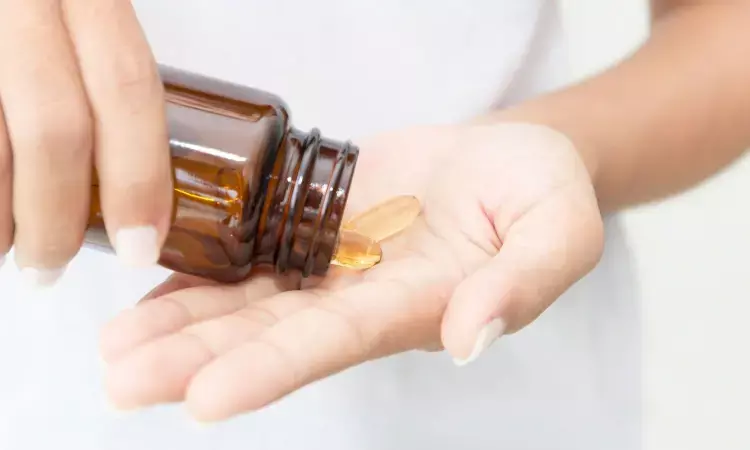- Home
- Medical news & Guidelines
- Anesthesiology
- Cardiology and CTVS
- Critical Care
- Dentistry
- Dermatology
- Diabetes and Endocrinology
- ENT
- Gastroenterology
- Medicine
- Nephrology
- Neurology
- Obstretics-Gynaecology
- Oncology
- Ophthalmology
- Orthopaedics
- Pediatrics-Neonatology
- Psychiatry
- Pulmonology
- Radiology
- Surgery
- Urology
- Laboratory Medicine
- Diet
- Nursing
- Paramedical
- Physiotherapy
- Health news
- Fact Check
- Bone Health Fact Check
- Brain Health Fact Check
- Cancer Related Fact Check
- Child Care Fact Check
- Dental and oral health fact check
- Diabetes and metabolic health fact check
- Diet and Nutrition Fact Check
- Eye and ENT Care Fact Check
- Fitness fact check
- Gut health fact check
- Heart health fact check
- Kidney health fact check
- Medical education fact check
- Men's health fact check
- Respiratory fact check
- Skin and hair care fact check
- Vaccine and Immunization fact check
- Women's health fact check
- AYUSH
- State News
- Andaman and Nicobar Islands
- Andhra Pradesh
- Arunachal Pradesh
- Assam
- Bihar
- Chandigarh
- Chattisgarh
- Dadra and Nagar Haveli
- Daman and Diu
- Delhi
- Goa
- Gujarat
- Haryana
- Himachal Pradesh
- Jammu & Kashmir
- Jharkhand
- Karnataka
- Kerala
- Ladakh
- Lakshadweep
- Madhya Pradesh
- Maharashtra
- Manipur
- Meghalaya
- Mizoram
- Nagaland
- Odisha
- Puducherry
- Punjab
- Rajasthan
- Sikkim
- Tamil Nadu
- Telangana
- Tripura
- Uttar Pradesh
- Uttrakhand
- West Bengal
- Medical Education
- Industry
Administration of Oral linoleic acid immediately before glucose load slows elevation of postprandial blood sugar level

Japan: A recent study has shown that oral administration of linoleic acid (LA), a GPR40 and GPR120 agonist, immediately before glucose load improved postprandial hyperglycemia.
The researchers suggest that it may be due to the slowing of gastric emptying via the promotion of GLP-1 secretion and the mechanisms may be associated with the GPR120 pathway.
The findings, published in Frontiers in Pharmacology, imply that linoleic acid contained in dietary fat may, therefore, improve postprandial hyperglycemia in patients with type 1 diabetes mellitus
Fatty acids are a major nutrient in dietary fat, some of which are ligands of long-chain fatty acid receptors, including GPR 40 (G-protein-coupled receptor) and GPR120. Pretreatment with GPR40 agonists enhanced insulin secretion in response to elevated blood glucose levels after glucose load in a diabetes model, but pretreatment with GPR120 agonists did not ameliorate postprandial hyperglycemia.
Yuta Yamamoto, Wakayama Medical University, Wakayama, Japan, and colleagues investigated whether oral administration of LA immediately before glucose load would impact the elevation of postprandial blood glucose levels in rats.
The study included male rats and rats with type 1 diabetes (T1D) administered streptozocin. They were orally administered LA, trilinolein, α-linolenic acid (α-LA), oleic acid, TAK-875, or TUG-891 immediately before glucose load.
Measurement of blood glucose levels was done before, then 15, 30, 60 and 120 min after the glucose load. The uptake of [14C] α-MDG for 30 min with or without LA was measured using CACO-2 cells.
15 and 30 min after glucose load, from rats administered LA was collected. Blood samples were collected for measurement of GLP-1 (glucagon-like peptide 1) and cholecystokinin concentrations.
The study revealed the following findings:
- The elevation of postprandial blood glucose levels was slowed by linoleic acid but not by trilinolein in rats without promotion of insulin secretion, and this effect was also observed in rats with type 1 diabetes.
- The uptake of α-MDG, an SGLT-specific substrate, was, however, not inhibited by LA.
- Gastric emptying was slowed by LA 15 min after glucose load, and GLP-1, but not cholecystokinin, level was elevated by LA 15 min after glucose load.
- TUG-891, a GPR120 agonist, ameliorated postprandial hyperglycemia but TAK-875, a GPR40 agonist, did not.
- Pretreatment with AH7614, a GPR120 antagonist, partially cancelled the improvement of postprandial hyperglycemia induced by LA.
- α-LA, which has a high affinity with GPR120 and LA, slowed the elevation of postprandial blood glucose levels, but oleic acid, which has a lower affinity with GPR120 than LA, did not.
"Oral administration of free LA, a GPR120 agonist, immediately before glucose load improved postprandial glucose levels independent from insulin," the researchers concluded.
Reference:
Yamamoto, Y., Narumi, K., Yamagishi, N., Nishi, T., Ito, T., Iseki, K., Kobayashi, M., & Kanai, Y. (2023). Oral administration of linoleic acid immediately before glucose load ameliorates postprandial hyperglycemia. Frontiers in Pharmacology, 14. https://doi.org/10.3389/fphar.2023.1197743
Dr Kamal Kant Kohli-MBBS, DTCD- a chest specialist with more than 30 years of practice and a flair for writing clinical articles, Dr Kamal Kant Kohli joined Medical Dialogues as a Chief Editor of Medical News. Besides writing articles, as an editor, he proofreads and verifies all the medical content published on Medical Dialogues including those coming from journals, studies,medical conferences,guidelines etc. Email: drkohli@medicaldialogues.in. Contact no. 011-43720751


